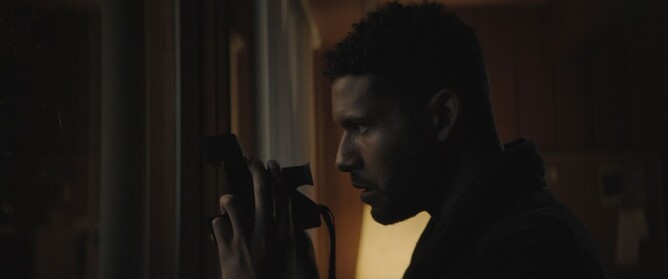SPIRAL
Written by Colin Minihan & John Poliquin
Directed by Kurtis David Harder
SPIRAL starts with a – literal – cold opening of a queer-bashing scene in a 1985 snowy parking lot before leaping ten years into the future. In 1995 it’s the gentle drive in to small town USA by gay dads – Aaron and Malik - and their sixteen year old daughter Kayla. Malik, played by Jeffrey Bowyer-Chapman, is the former big city, club kid, drag queen, who has stole the heart of much older Aaron – the natural father of their kid. He is also the witness to the harrowing scene we see at the start and it is soon clear he is, unsurprisingly, still haunted by this memory. Coming to such a quiet, conservative - with a small ‘c’ - corner of America puts the unconventional family in the spotlight and the unwanted attention has a much greater impact on Malik than anyone else. He is meant to be writing the next bestseller while Aaron goes out earning, but his experiences left home alone turn him into the film’s detective character. The trigger to his worst fears of bigotry comes when he returns home one day to discover the word ‘FAGGOTS’ sprayed on the sitting room wall. Before Aaron or Kayla return, he paints over it. He even keeps it to himself. The first of many times where he doesn’t share his feelings of vulnerability with Aaron. His only outlet is phone calls back to an ex-boyfriend in the city – presumably the victim of the hate crime from 1985. Meanwhile, Kayla gets a job and forms a loving relationship with the boy next door – rebel without a clue Tyler. Incidents conspire to drive a wedge between Malik and his family as his snooping combined with disassociative episodes lead him to unearth a town-wide secret. By this stage Aaron is getting a little tired of Malik’s indiscretions and lack of work ethic. With nothing to lose Malik strives to simultaneously confront his demons and solve the mystery of the ‘spiral’ he’s seen in his garage, on the spine of a book and in a VHS from 1985.
Natural prejudices and bias are very powerful storytelling tools when putting the audience off the scent of where SPIRAL might be heading. A sneering old man who doesn’t return Malik’s friendly greeting is anti-gay, right? But when overt homophobia - akin to the opening scene - never really manifests itself like all the signs point to, there’s a new nagging feeling something ain’t right and that’s Malik’s dilemma. When he finds out the truth he’s unable to save himself, let alone his husband and kid. The fears over his difference were real, but Malik was looking down the wrong end of the telescope. It’s a brutally simple, harrowing take down of your own presumptions of how prejudice works. In the terrifying, Kafka-esque closing moments, Malik learns the people he feared have no problem with his race or sexuality. It’s a net benefit to them because they can exploit the nature of public perception of minority groups to achieve their dastardly, decennial goals. GET OUT (2017) is the comparable freshest in the mind for subverting expectations of the Pinter-esque disguise of what’s really happening, but given SPIRAL commits to a supernatural path over the sci-fi explanation Jordan Peele provides, SOCIETY (1989) is an equally useful indicator – although there are few, if any laughs in SPIRAL.


